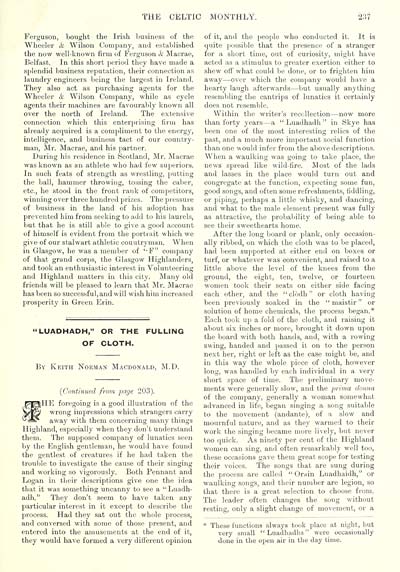Blair Collection > Celtic monthly > Volume 6, 1898
(339)
Download files
Complete book:
Individual page:
Thumbnail gallery: Grid view | List view

THE CELTIC MONTHLY.
S3t
Ferguson, bought the Irish business of the
Wheeler & Wilson C!onipany, and established
the now well-known firm of Fei'guson & Macrae,
Belfast. In this short period they have made a
splendid business reputation, their connection as
laundry engineers being the largest in Ireland.
They also act as purchasing agents for the
Wheeler & Wilson Company, while as cycle
agents their machines are favourably known all
over the north of Ireland. The extensive
connection which this enterprising firm has
already acquired is a compliment to the energy,
intelligence, and business tact of our country-
man, Mr. Macrae, and his partner.
During his residence in Scotland, Mr. Macrae
was known as an athlete who had few superiors.
In such feats of strength as wrestling, putting
the ball, hammer throwing, tossing the caber,
etc., he stood in the front rank of competitors,
winning over three hundred prizes. The pressure
of business in the land of his adoption has
prevented him from seeking to add to his laurels,
but that he is still able to give a good account
of himself is evident from the portrait which we
give of our stalwart athletic countryman. When
in Glasgow, he was a member of '-F" company
of that grand corps, the Glasgow Highlanders,
and took an enthusiastic interest in Volunteering
and Highland matters in this city. Many old
friends will be pleased to learn that Mr. Macrae
has been so successful, and will wish him increased
prosperity in Green Erin.
'LUADHADH," OR THE FULLING
OF CLOTH.
By Keith Norman Macdonald, M.D.
[Continued from puge 203).
|p|R||HE foregoing is a good illustration of the
W^ wrong impressions which strangers carry
^■d^ away with them concerning many things
Highland, especially when they don't understand
them. The supposed company of lunatics seen
by the English gentleman, he would have found
the gentlest of creatures if he had taken the
trouble to investigate the cause of their singing
and working so vigorously. Both Pennant and
Logan in tlieir descriptions give one the idea
that it was something uncanny to see a "Luadh-
adh." They don't seem to have taken any
particular interest in it except to describe the
process. Had they sat out the whole process,
and conversed with some of those present, and
entered into the amusements at the end of it,
they would have formed a very diti'eient opinion
of it, and the people who conducted it. It is
quite possible that the presence of a stranger
for a short time, out of curiosity, might have
acted as a stimulus to greater exertion either to
shew ofl' what could be done, or to frighten him
away — over which the company would have a
hearty laugh afterwards — but usually anything
resembling the cantrips of lunatics it certainly
does not resemble.
Within the writer's recollection — now more
than forty years — a " Luadhadh " in Skye has
been one of the most interesting relics of the
past, and a much more important social function
than one would infer from the above description;?.
When a waulking was going to take place, the
news spread like wild-fire. Most of the lads
and lasses in the place would turn out and
congregate at the function, expecting some fun,
good songs, and often some refreshments, fiddling,
or piping, perhaps a little whisky, and dancing,
and what to the male element present was fully
as attractive, the probability of being able to
see their sweethearts home.
After the long board or plank, only occasion-
ally ribbed, on which the cloth was to be placed,
had been sujjported at either end on boxes or
turf, or whatever was convenient, and raised to a
little above the level of the knees from the
ground, the eight, ten, twelve, or fourteen
women took their seats on either side facing
each other, and the " cl6dh " or cloth having
been previously soaked in the " maistir " or
solution of home chemicals, the process began.*
Each took up a fold of the cloth, and raising it
about six inches or more, brought it down upon
the board with both hands, and, with a rowing
swing, handed and passed it on to the person
next her, right or left as the case might be, and
in this way the whole piece of cloth, however
long, was handled by each individual in a very
short space of time. The jjreliminary move-
ments were generally slow, and the prima donna
of the company, generally a woman somewhat
advanced in life, began singing a song suitable
to the movement (andante), of a slow and
mournful nature, and as they warmed to their
work the singing became more lively, but never
too quick. As ninety per cent of the Highland
women can sing, and often remarkably well too,
these occasions gave them great scope for testing
their voices. The songs that are sung during
the process are called " Grain Luadhaidh," or
waulking songs, and their number are legion, so
that there is a great selection to choose from.
The leader often changes the song without
resting, only a slight change of movement, or a
* These functions always took place at night, but
very small " Luadhadhs " were occasionally
done in the open air in the day time.
S3t
Ferguson, bought the Irish business of the
Wheeler & Wilson C!onipany, and established
the now well-known firm of Fei'guson & Macrae,
Belfast. In this short period they have made a
splendid business reputation, their connection as
laundry engineers being the largest in Ireland.
They also act as purchasing agents for the
Wheeler & Wilson Company, while as cycle
agents their machines are favourably known all
over the north of Ireland. The extensive
connection which this enterprising firm has
already acquired is a compliment to the energy,
intelligence, and business tact of our country-
man, Mr. Macrae, and his partner.
During his residence in Scotland, Mr. Macrae
was known as an athlete who had few superiors.
In such feats of strength as wrestling, putting
the ball, hammer throwing, tossing the caber,
etc., he stood in the front rank of competitors,
winning over three hundred prizes. The pressure
of business in the land of his adoption has
prevented him from seeking to add to his laurels,
but that he is still able to give a good account
of himself is evident from the portrait which we
give of our stalwart athletic countryman. When
in Glasgow, he was a member of '-F" company
of that grand corps, the Glasgow Highlanders,
and took an enthusiastic interest in Volunteering
and Highland matters in this city. Many old
friends will be pleased to learn that Mr. Macrae
has been so successful, and will wish him increased
prosperity in Green Erin.
'LUADHADH," OR THE FULLING
OF CLOTH.
By Keith Norman Macdonald, M.D.
[Continued from puge 203).
|p|R||HE foregoing is a good illustration of the
W^ wrong impressions which strangers carry
^■d^ away with them concerning many things
Highland, especially when they don't understand
them. The supposed company of lunatics seen
by the English gentleman, he would have found
the gentlest of creatures if he had taken the
trouble to investigate the cause of their singing
and working so vigorously. Both Pennant and
Logan in tlieir descriptions give one the idea
that it was something uncanny to see a "Luadh-
adh." They don't seem to have taken any
particular interest in it except to describe the
process. Had they sat out the whole process,
and conversed with some of those present, and
entered into the amusements at the end of it,
they would have formed a very diti'eient opinion
of it, and the people who conducted it. It is
quite possible that the presence of a stranger
for a short time, out of curiosity, might have
acted as a stimulus to greater exertion either to
shew ofl' what could be done, or to frighten him
away — over which the company would have a
hearty laugh afterwards — but usually anything
resembling the cantrips of lunatics it certainly
does not resemble.
Within the writer's recollection — now more
than forty years — a " Luadhadh " in Skye has
been one of the most interesting relics of the
past, and a much more important social function
than one would infer from the above description;?.
When a waulking was going to take place, the
news spread like wild-fire. Most of the lads
and lasses in the place would turn out and
congregate at the function, expecting some fun,
good songs, and often some refreshments, fiddling,
or piping, perhaps a little whisky, and dancing,
and what to the male element present was fully
as attractive, the probability of being able to
see their sweethearts home.
After the long board or plank, only occasion-
ally ribbed, on which the cloth was to be placed,
had been sujjported at either end on boxes or
turf, or whatever was convenient, and raised to a
little above the level of the knees from the
ground, the eight, ten, twelve, or fourteen
women took their seats on either side facing
each other, and the " cl6dh " or cloth having
been previously soaked in the " maistir " or
solution of home chemicals, the process began.*
Each took up a fold of the cloth, and raising it
about six inches or more, brought it down upon
the board with both hands, and, with a rowing
swing, handed and passed it on to the person
next her, right or left as the case might be, and
in this way the whole piece of cloth, however
long, was handled by each individual in a very
short space of time. The jjreliminary move-
ments were generally slow, and the prima donna
of the company, generally a woman somewhat
advanced in life, began singing a song suitable
to the movement (andante), of a slow and
mournful nature, and as they warmed to their
work the singing became more lively, but never
too quick. As ninety per cent of the Highland
women can sing, and often remarkably well too,
these occasions gave them great scope for testing
their voices. The songs that are sung during
the process are called " Grain Luadhaidh," or
waulking songs, and their number are legion, so
that there is a great selection to choose from.
The leader often changes the song without
resting, only a slight change of movement, or a
* These functions always took place at night, but
very small " Luadhadhs " were occasionally
done in the open air in the day time.
Set display mode to: Large image | Transcription
Images and transcriptions on this page, including medium image downloads, may be used under the Creative Commons Attribution 4.0 International Licence unless otherwise stated. ![]()
| Early Gaelic Book Collections > Blair Collection > Celtic monthly > Volume 6, 1898 > (339) |
|---|
| Permanent URL | https://digital.nls.uk/75858512 |
|---|
| Shelfmark | Blair.58 |
|---|---|
| Additional NLS resources: | |
| Attribution and copyright: |
|
| Description | A selection of books from a collection of more than 500 titles, mostly on religious and literary topics. Also includes some material dealing with other Celtic languages and societies. Collection created towards the end of the 19th century by Lady Evelyn Stewart Murray. |
|---|
| Description | Selected items from five 'Special and Named Printed Collections'. Includes books in Gaelic and other Celtic languages, works about the Gaels, their languages, literature, culture and history. |
|---|

